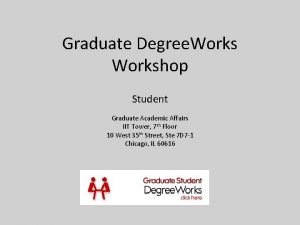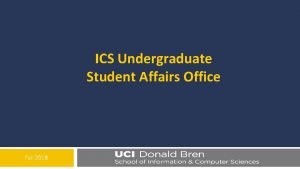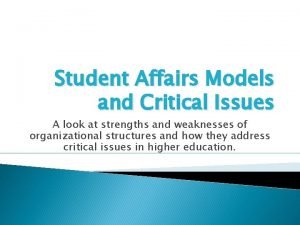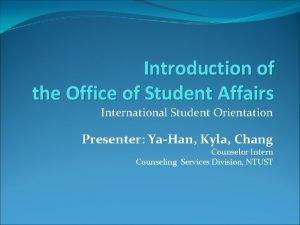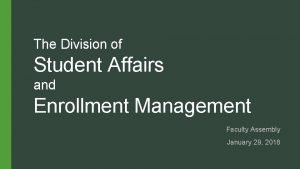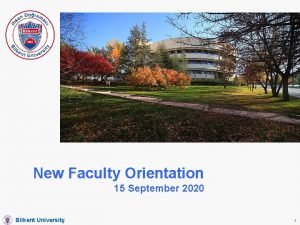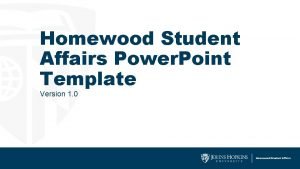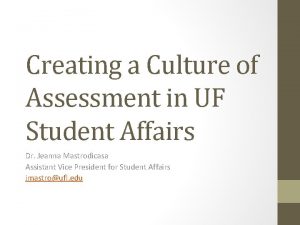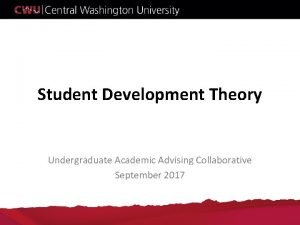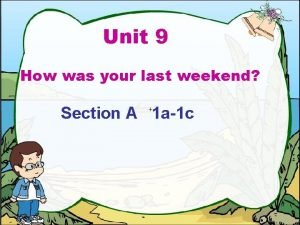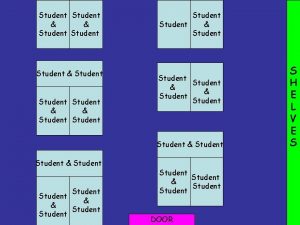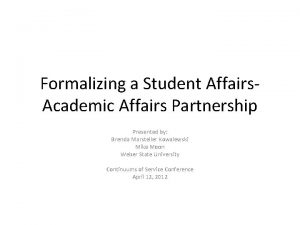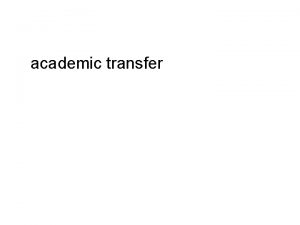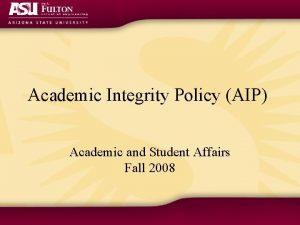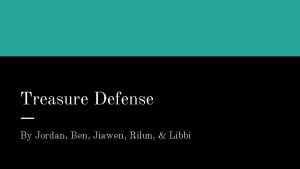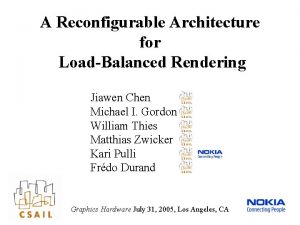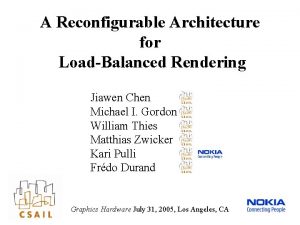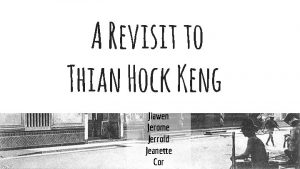Student Affairs Academic Affairs Group 2 Jiawen Group









- Slides: 9

Student Affairs & Academic Affairs Group 2 Jiawen Group 2 Zhang Darlene Leifson Yolima Cueto

Student Affairs ● ● Methodolog y Academic Affairs Research Objectives & Questions Data Collection: ○ ○ ○ U. S. Bureau of Labor Statistics Higher Ed Jobs The Chronicle of Higher Education Inside Higher Ed Qualitative Interviews Reports, academic articles, and monographs

Qualifications, Competencies, skills & Theoretical Framework Main obje cti Good ve comm un Abi ication lity t o moti va Stud te ents The status quo of field o Racial demographics underrepresented (Inside Higher Ed. ) o Pay-equity issues Theoretical Framework Forms to evaluate students’ success (Terenzini, 2019) 1. The degree completion 2. The increased ability of knowledge gain & higher-order thinking 3. The personal & interpersonal maturity development 4. The improvement of moral-reasoning skill 5. The change or revised attitudes & values 6. The preparation for occupation 7. The benefits gained for economic & occupation 8. The enhancement of life quality

Student Affairs & Faculty Collect students’ feedbacks and reflections Faculty Promote students’ higher-order thinking with the combination of academic learning and activity involvement. Promote activities that engage students with different backgrounds Informational Interview Key questions • Qualifications needed to prepare for future jobs • Higher ED. internship on campus while studying • Career opportunities for M. Ed (student affairs) students • Tips for helping student affairs professionals find a job Interviewee: Dr. David Guthrie Interviewer: Jiawen Zhang

Academic Affairs Faculty Development • A v • Q ailable Jo ualifi bs c a t io comp eten ns, skills, Facu c and lty D ies for evelo Direc pme t o • Tr rs nt ends and I -Lack ssue of in s truct s peda ions g in -Dive ogy rse t r -Std. -cent aining ered teach ing

Qualifications, Competencies, skills & Theoretical Framework Academic Affairs Institutional Research skills ng IR Hiri g analytical tatistical s n ü Stro y to develop m t i r l i o ü Ab ses to perf ch studies; y r l a ana al rese trators, n o i t a educ minis sist ad ff in the s a d n dies a a ch stu and st u s y t f l o u c fa on for entati tware implem ce with sof SS, SAS. . t (SP erien ü Exp managemen data Strong analytical skills IR : “research conducted within an institution of higher education in order to provide information which supports institutional planning, policy formulation, and decision making" Saupe (as cited in Terenzini, 1993, p. 2) Types of intelligence to the effective functioning in IR (Terenzini, 1993) 1. Technical/Analytical Intelligence: Substantive & Methodological 2. Issues Intelligence 3. Contextual Intelligence

IR-Institution-Student Affairs Intersection Informational Interview • Reports: internal and external administrative reports • • Research, Planning & Policy Analysis: planning Forecasting/statistical projections, longitudinal research, and market and survey research • Financial Studies: cost analysis, budget planning • Enrollment Management Studies: admission, financial aid, and retention studies • Faculty Studies: faculty evaluations, faculty workload studies, and salary analyses • Academic Studies: academic program review, academic program evaluation, assessment of placement tests and outcomes assessment (Delaney, 1997) Institutional Research VS Institutional Effectiveness • Institutional Research : works on the creation of reports • Institutional Effectiveness focusses on analyzing these reports Interviewee: Kandice Gibson Interviewer: Yolima Cueto

Student Affairs ● ● ● Academic Affairs A commitment to student success The use of data to inform decision-making Growth in administrative and non-instructional positions ○ ● What they share Administrative bloat? (Ginsberg, 2011) An emphasis on the link between student engagement and learning : ○ Effective linkages between student learning outcomes assessment and planning are those where measures of student learning inform and drive the institution’s academic planning process (Middaugh, 2009)

Student Affairs Referenc es Academic Affairs Delaney, A. M. Research in Higher Education (1997). The Role of Institutional Research in Higher Education: Enabling Researchers to Meet New Challenges, 38(1). Retrieve from https: //link-springer-com. ezaccess. libraries. psu. edu/article/10. 1023/A%3 A 10 24907527884. Ginsberg, B. (2011). The fall of the faculty: The rise of the all-administrative university and why it matters. New York: Oxford University Press. Middaugh, M. (2009). Closing the loop: Linking planning and assessment. Planning for Higher Education, 37(3), 5 -14. Report: Student affairs professionals more diverse than rest of college professions. (n. d. ). Retrieved from https: //www. insidehighered. com/news/2018/11/02/report-student-affairsprofessionals-more-diverse-rest-college-professions. Terenzini, P. T. Res High Educ (1993). On the nature of institutional research and the knowledge and skills it requires, 34(1). Retrieve from https: //link-springer-com. ezaccess. libraries. psu. edu/article/ 10. 1007/BF 00991859. Terenzini, P. T. (2019). MISSING THE FOREST FOR THE TREES: RETHINKING WHAT INFLUENCES STUDENT SUCCESS. Presentation, University Park Campus, Penn State University.
